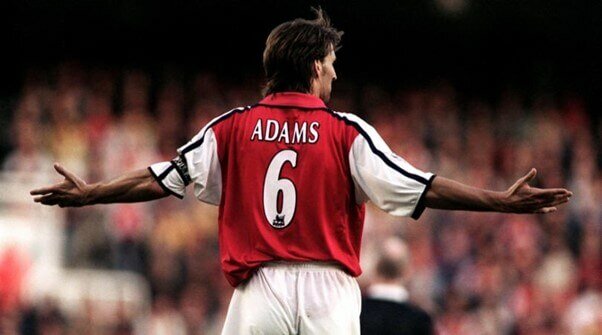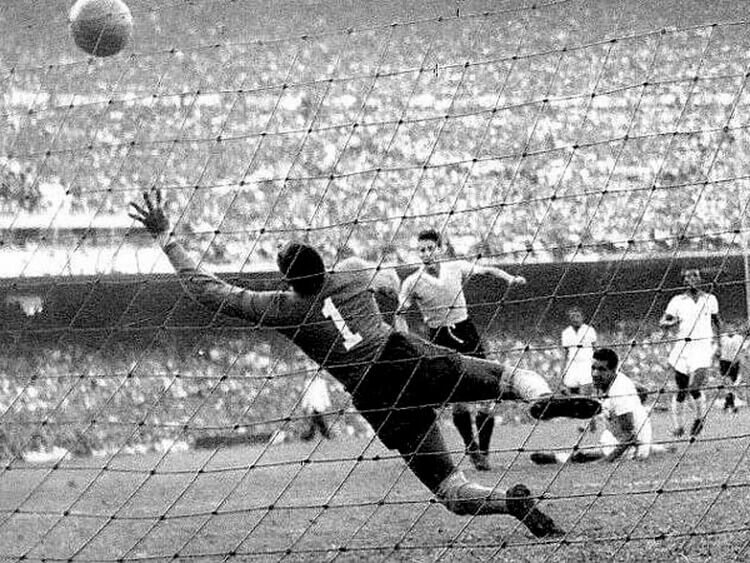THE ENIGMA OF TONY ADAMS: A FIRST AMONG EQUALS
CHENGAPPA CARIAPA |14th September 2020

Every football club has had its fair share of legendary players. The love that radiates from supporters is not just born out of the highlight reels such as goals, assists or matchwinning performances. An immense amount of it is for the player’s presence and devotion towards the club that transpires over the years. At Arsenal, there are multiple individuals who have graced their presence in the club and have been fan favourites during their time. Common names that every Arsenal supporter love going on about are Thierry Henry, Dennis Bergkamp, Michael Thomas and countless others, much to the annoyance of other fans around them after a point. The Invincibles and the great title winning teams of 1988 and 1998 have had their story written in football folklore with historic team performances.
However, in the midst of the pride and talk about the glory days, there is an interesting aspect to these teams that often goes missing. It is the presence of the players born and bred by the club. As an Arsenal fan, a certain trend that struck me was that there was only a handful of academy players who stayed through till the very end of their careers and endorsed the literal meaning of a ‘one-man club’. Of course, the choice is often not up to the players regarding the trajectory of their career which could be blighted by almost anything. Nevertheless, the only prominent name in the past few decades that came to my mind was Tony Adams.
Born, bred and developed at Arsenal, he justified the management’s decision to make him captain at the age of 21. But more importantly, he justified the notion that consistency and faith will always pay dividends through the course of one’s life.
He was truly was “one of our own.”
Arsenal through and through

“I will sign every Arsenal contract put in front of me without reading it.”
He’s Mr.Arsenal for a reason. A name that stands out and epitomizes loyalty in its essence. After all, some players manage to create such an unshakeable legacy that images of them doing what they did best on the flash every time someone brings the name of the club up. Whether it’s a Steven Gerrard or a Ryan Giggs, they’ve gone on to become synonymous with the clubs they played their hearts out for.
Adams wasn’t any different. Raised in East London, he was still a schoolboy when he signed for the Gunners, going on to make his first division debut at the age of 17. Little did Adams know that it would only be 4 years later till he got the captain’s arm band. In the numerous years spent at the club, he would bear witness to 4 first division titles, 3 FA Cups and a European Cup Winner’s Cup amongst several individual accolades. Together with Steve Bould, Nigel Winterburn and Lee Dixon, he formed a formidable defence that flourished under George Graham in the early 90s. Adams’ lionhearted leadership ushered in the golden years of Arsenal in the late 20th and early 21st century.
The physical concept of a stopper was in its literal sense meant for rough, tough and beastly intimidating centre-backs. It was at Arsenal that Tony Adams built up a niche for hard-tackling and aerial domination coupled with an ever-present hunger for a rough up during the game. George Graham did not prefer ball-playing centre backs and depended heavily on his defence play a low line and ‘just defend’. This was an era where the latter sentiment was emphasized on and for the times especially, there weren’t many better than Big Tone.
However, amongst all the innovations brought about from a certain Frenchman, a tactical reinvention was one Arsène Wenger brought to Arsenal. He utilised the already formidable defenders at his disposal and entrusted them as ball-playing centre backs-a tough step indeed for men so accustomed to straying away from the technical side of things as a result of the footballing zeitgeist.
Soon enough, as a central defender that formed an integral part in 2 of Wenger’s 3 Premiership title-winning teams, Adams instated himself as one of the best players in the world in his position in a period that followed him leading England to the semi-finals of Euro ’96, a competition that continues to be raved about for its cult status in English footballing folklore. Rodders was hailed for his exemplary performances and gave hope to a country that was tormented for its lack of success in the international arena.

So much so that even Sir Alex Ferguson expressed an intention to sign Adams during the late 90s, time and again. Circumstances of course proved otherwise but it was Adams who was always firm in his stance at staying at the club he called home and instead had candid chats with the Chairman, laying emphasis on the need for investing in world-class players.
The word you’re looking for is loyalty but with Big Tone, isn’t that the first thing that comes to mind?
His first league title victory came as captain in 1989 one a day which is regarded as one of the most dramatic finishes in the history of English football. The two-goal victory margin was mandatory for the Gunners to win the league. The defence marshalled by Adams himself was rock solid and of course, his leadership was key on that historic night. While Michael Thomas scored that goal to settle things, one can’t deny the fact that if Adams hadn’t led the defence into becoming an impenetrable force, would Alan Smith and Thomas’ goals have mattered? If anything, they would have been an afterthought.

1989. JVC kits. Trophies.
Another competition where Adams showed once again that you can go to war with him was the European Cup Winners Cup Final in 1994, a competition not many backed Arsenal to take home. The Gunners’ bulletproof defence was on display throughout the tournament in a run of 7 matches with the team conceding only 1 goal from the 2nd round onwards to the final. However, the final was against the-then European heavyweights Parma. It was most definitely ‘1-0 to the Arsenal’ that day as Gianfranco Zola and Tomas Brolin were repeatedly kept at bay by a defensive masterclass from a team so tactically astute.
The absences of Ian Wright and Martin Keown only invigorated the team further and it was Tony Adams who lead the way with a flurry of key interceptions and tackles throughout the game. Thus, defying all odds yet again.
Adams always reiterated the status of the club and was very vocal about his requirements to the management and of his players under him. The importance of a player of his stature cannot be stressed enough and it is something that the Gunners have failed to replicate over the past decade.
But in the midst of his on-field performances, there was something brewing under the surface.
Into the crevice
“For 12 years I was drinking, and for 11 and a half, I didn’t want to stop”.
Club repercussions in English football for drinking were few and far between until the turn of the century. The English pub and hooligan culture flourished with unrestricted control and minimal government regulation throughout the 80s and 90s. Fan brawls were common and inadvertently always spiralled out of control. In the midst of this, players too sometimes got carried away with things and when you add the fact that footballers are practically demigods in England, it doesn’t always make for the best of concoctions.
Alcoholism has claimed many a victim over the years and Tony Adams was one himself. He was part of the infamous ‘Tuesday Club’, a set of players who often visited nearby pubs as part of off-field bonding sessions initiated by George Graham. Attending regular weekly drinking sessions right from his early days as a player took their toll on him in the form of diagnosed alcoholism.
For an approximate period of 12 years, he continued his consumption under the pretext of getting a necessary high and was not aware of the abuse his body went through. To add to it, there were minimal facilities of awareness and recourse which could have avoided the sudden downfall he faced, both mentally and physically.

Was George Graham’s influence a recipe for disaster for Adams off the pitch or was this just a sign of the times?
Adams was a victim of this and began a lengthy period of suffering by spending 4 months in Chelmsford jail in 1991 for drunk driving, a truly shocking event for a captain and a person so heavily revered and looked up to. He stated that the run up to the Euros in 1996 were some of the worst memories of his life. He hallucinated, regressed and had recurring family issues, coupled with isolation and loneliness. To add to it, there was pressure from the media regarding his captaincy in the national team. But the worst of all was that drinking became an integral part of his daily life, habitually more so than football. More so than most things. It wasn’t just a vice anymore; it was a necessity.
An anecdote from Lee Dixon paints a graphic picture of the extent of Tony’s struggle with alcohol.
“Tony and a few others used to come in some days, we’d get weighed on a Friday. Tony used to put a bin-bag on to sweat it out because he had been drinking all week.”
As modern-day football fans, it is hard to imagine one of the current players placing a plastic bag to sweat out toxins before being weighed in every week. Gattuso, Simeone or Klopp would blow up the changing room if that happened. Social media would be on overdrive with character assassinations galore to pile on the misery and some of the toxic press would be right in their element to do what they do best.
But putting everything aside, it was the fear of admission and the opportunity of getting away that deferred Adams from ever owning up to his addiction. The Arsenal icon’s battles with alcoholism weren’t merely a case of a habitual problem, but a constant struggle with his mental health and in an interview with the Daily Mail earlier this year, he shines light on the extent to which he was living on the edge.
“Alcohol gave me a good hiding. Prison, intensive care, p***ing myself, s***ting myself, still not giving it up. Sleeping with people I didn’t want to sleep with. That’s where it took me. At the end of my drinking, I did not want to live but I didn’t know how to kill myself.”
But things changed and certainly for the better.
Adams won his biggest battles off the pitch
But with Mr Arsenal, the story of recourse and recovery follows a distinct trajectory. He did it all by himself. Attending Alcoholics Anonymous meetings and coming out to the public had massive benefits. In the period post the Euros, his consumption reduced majorly. He made regular public statements and monitored himself by making a conscious effort, especially with his teammates around him. Even in the midst of his mental pain and trauma, he took it upon himself to lead by example and explicitly told the press about his addiction. Of course, a certain amount of credit must go to Arsène Wenger for altering dietary and fitness protocols at the club upon his arrival and also for sticking by and ensuring there was adequate support for Adams in the subsequent years, post his public confession.
It was this second chance at things, coupled with an inauguration of Adams’ foundation called the Sporting Chance Clinic that helped build a safe and secure space for athletes undergoing emotional health issues. It drove him to help eliminate the stigma behind addiction and form a road to recovery for those like him. And time and again, he continued to prove that there was more fuel left in the tank than was shown to be. The will to change was key and Adams must be given immense credit to this day for turning things around and most importantly, trying to.
He came out of his addiction a changed man and a few years later, had lifted two premier league titles adorning the Arsenal jersey. A genuine leader through and through.
An iconic moment of his career was against Everton in 1998 when Arsenal needed just one game to win their maiden Premier League title. With the score favouring Arsenal at 3-0, the game had long been won. Latching onto a chip from his defensive partner Steve Bould, Adams unleashed a sublime half-volley past the Everton goal keeper in the final few minutes. The ever present and impatient Arsenal fans who were waiting for the final whistle had a major cause for jubilation at that moment, especially since the source itself was from none other than their beloved captain.
A truly iconic moment for the club and for Adams himself who described that as the best moment of his career, given the condition and recovery that he was in a just 2 years before.

He came out of his addiction a changed man and a few years later, had lifted two Premier league titles adorning the Arsenal jersey. A genuine leader through and through.
Tony Adams has gone down in football history as one of the best centre-backs of all time both for England and of course in the first division of English football. Looking back at a formidable career at Arsenal, he will of course be proud of representing the club, accolades he won and not to mention his notable statue outside the Emirates Stadium. But it is perhaps his victory in the battles against his own demons that he cherishes the most.
“I’m 24 years without a drink or a drug inside me. It’s not a part of my being today, it’s not a thing. I still check in and go to regular AA meetings and keep it fresh, because we as human beings can forget. We’ve got ‘romantic recall’, they call it, when we think only of the good times.”
As an Arsenal fan and at the risk of speaking for the entire fanbase, we will always be proud of a man who led by example through both his words and actions. For sticking by the club that gave him a second chance and made him the player he wanted to be. Who inspired individuals through his leading the way and discovering how to never lose hope. And of course, defining and giving meaning to the history and culture embedded in every Arsenal player and fan.
He truly is cast in bronze.
Read More
ADIOS DAVID SILVA: NUMBERS DON’T DO JUSTICE TO THE PREMIER LEAGUE’S MOST UNIQUE GENIUS
SRINIVAS SADHANAND \
FEATURES
CAN WE START CALLING IMMOBILE WORLD-CLASS?
HARSHAVARDHAN GHADGE \
FEATURES
MARACANAZO ’50: THE DARKEST DAY IN BRAZILIAN FOOTBALL
ANURAG PEESARA \
THROWBACKS



